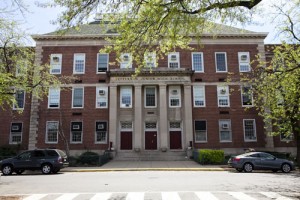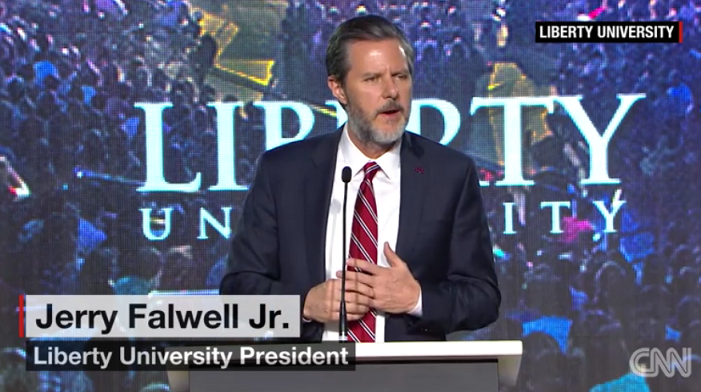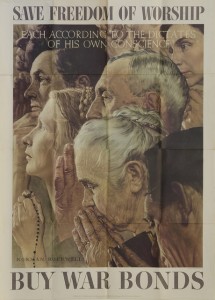
David Barton was a guest on Michael Brown’s Line of Fire show recently and spun some familiar yarns.
A story that has been around awhile (since Barton’s 1989 book Myth of Separation) is his claim that Thomas Jefferson incorporated the Bible and Isaac Watts hymnal into the curriculum of the Washington D.C. schools while Jefferson was president. This claim has been thoroughly debunked before by others, notably Jim Allison and Chris Rodda. While those authors documented well their rebuttal to Barton, I like to consult the primary sources for myself. Here I lay out Barton’s claim followed by the truth.
Listen to Barton on Line of Fire:
Transcript:
When he became president of the United States, the Constitution authorizes that Washington, D.C. be run by the federal government, not by any state. So the schools of Washington, D.C. are under federal control. This is a new city when he moves in, he’s the president, he’s the first president to have a full term in the White House, everything else was in New York and Philadelphia, so he gets a full term, brand new city to him, he is now in charge of Washington, D.C. public schools as well. So he’s on the school board for Washington, D.C. public schools, they have to start the system, he authors the plan of education for Washington, D.C. public schools and he installs two reading texts for Washington, D.C. public schools, one is Isaac Watts hymnal, which is where we get the hymns like Joy to the World, etc., that’s what they learned to read from, and the Bible is the other one, and so Jefferson did that.
Barton refers to this story in The Jefferson Lies:
In 1805 President Jefferson was elected head of the board of trustees for the brand new Washington, DC, public schools. 51 He told the city council that he would “willingly undertake the duties proposed to me – so far as others of paramount obligation will permit my attention to them”; 52 that is, he would do what he could for the city schools with the caveat that his presidential duties came first. Robert Brent therefore served as head of the trustees instead of Jefferson; but as a trustee, Jefferson contributed much to the new school system. In fact, James Ormond Wilson, the first superintendent of the Washington, DC, public school system, affirmed that Jefferson was “the chief author of the first plan of public education adopted for the city of Washington.” 53 When the first report of the Washington public schools was prepared and released to document the progress of students, it announced:
Fifty-five have learned to read in the Old and New Testaments and are all able to spell words of three, four, and five syllables; twenty-six are now learning to read Dr. Watts’ Hymns and spell words of two syllables; ten are learning words of four and five letters. Of fifty-nine out of the whole number admitted [enrolled] that did not know a single letter, twenty can now read the Bible and spell words of three, four, and five syllables; twenty-nine read Dr. Watts’ Hymns and spell words of two syllables; and ten, words of four and five letters. 54
Most can probably visualize the Bible as a text to teach reading, 55 but what of Watt’s Hymns? Isaac Watts was a Christian theologian and hymn writer, penning some of the strongest doctrinal anthems in Christendom, including classics such as “Jesus Shall Reign,” “Joy to the World,” “O God our Help in Ages Past,” “When I Survey the Wondrous Cross,” “Am I a Soldier of the Cross,” “At the Cross,” and others. It was this hymnal, along with the Bible, that was used to teach reading to students in the school system whose plan of education was directly attributed to Thomas Jefferson.
Barton, David (2015-12-22). The Jefferson Lies: Exposing the Myths You’ve Always Believed About Thomas Jefferson (Kindle Locations 1813-1832). WND Books. Kindle Edition.
We can go to the very source Barton points readers to in the footnote to debunk this story — the article by J.O. Wilson on the history of the D.C. schools.* Let’s take the claims one by one.
Jefferson was elected to the D.C. school board in 1805. He accepted in a letter to Robert Brent and at the time told Brent he would “willingly undertake the duties proposed to me, so far as others of paramount obligation will permit my attention to them.” In other words, being president had to come first. After this, Barton’s claims are mostly false.
Did Jefferson Write the Plan of Education for Washington, D.C. Schools?
Barton says in his book that Jefferson authored the plan of education. However, the source he cited doesn’t say that. About Jefferson’s involvement in the D.C. plan of education, Wilson (Barton’s own source) wrote:
A notably comprehensive report, setting forth in detail the plan of the entire educational system from an academy to a university, was prepared by a select committee and adopted September 19, 1805. Mr Jefferson’s early and liberal contribution in money and his accepting and holding the offices of trustee and president of the board of trustees of public schools so long as he resided here show his personal interest in their establishment, and the fact that he had several years earlier proposed a quite similar plan of education for the state of Virginia and a few years later, in 1817, vigorously renewed his proposal, make a strong probability that he himself was the chief author of the first plan of public education adopted for the city of Washington.
Barton’s quotation of Wilson is where the mischief is. In The Jefferson Lies, Barton wrote:
In fact, James Ormond Wilson, the first superintendent of the Washington, DC, public school system, affirmed that Jefferson was “the chief author of the first plan of public education adopted for the city of Washington.”
But look at what Wilson wrote and notice what Barton omitted in The Jefferson Lies. Wilson said Jefferson’s donations and his prior work on education in Virginia
make a strong probability that he himself was the chief author of the first plan of public education adopted for the city of Washington. (bold print is what Barton left out of his quote)
Wilson did not affirm that Jefferson wrote the plan, he guessed Jefferson authored it based on circumstantial evidence. We don’t know what Jefferson’s role was in writing the plan.
Did Jefferson Make Sure the Bible Was Used in D.C. Schools?
Even if Jefferson did write the plan with his own hand, it destroys Barton’s claim because Jefferson didn’t include Bible in it. Wilson’s history provides a description of the 1805 plan:
In their plan the board of trustees said:
The academy shall consist of as many schools as circumstances may require, to be limited at present to two, one of which shall be situated east of the Capitol and within half a mile of it and the other within half a mile of the President’s house, it being understood that these positions are considered by the board as temporary, and consequently subject at any future time to alteration. In these schools poor children shall be taught reading, writing, grammar, arithmetic, and such branches of the mathematics as may qualify them for the professions they are intended to follow, and they shall receive such other instruction as is given to pay pupils, as the board may from time to time direct, and pay pupils shall, besides, be instructed in geography and in the Latin language. The schools shall be open each day, Sundays excepted, eight hours in summer and six hours in winter, to be distributed throughout the day as shall be fixed by the board, except during vacation, which shall not commence prior to the first of August, nor continue after the 10th of September, and whose duration shall be fixed by the board. (emphasis added)
There is no mention of the Bible or a hymnal by Watts or anyone else.
So where does Barton get the idea that Jefferson incorporated the Bible and Watts’ hymnal?
A little later in his article, Wilson described some developments after Jefferson left office.
In 1812, the Washington schools switched their methods to allow a D.C. school to follow the approach of an educator named Joseph Lancaster. Then in 1813, a report of the progress under the new educational plan was submitted. Wilson provides the entire report; I will cite the part of it misused by Barton:
In 1813 Mr Henry Ould made the first report of a Washington public school of which we have any record.
It reads as follows : February 10, 1813.This day 12 months ago I had the pleasure of opening under your auspices the second genuine Lancasterian school in America. The system was set in operation (as far as the nature of the room would admit) in this city on the 10th of February, 1812, in an inconvenient house opposite the General Post Office, but notwithstanding the smallness of the school-room there were 120 scholars entered on the list during the first three months. I was then under the necessity of delaying the admission of scholars, as the room would not accommodate more than 80 to 100 scholars. It now becomes my duty to lay before you an account of the improvement of the scholars placed under my direction in your institution, which I shall do in the following order:
OF NUMBERS
130 scholars have been admitted into your institution since the 10th of February, 1812, viz., 82 males and 48 females, out of which number 2 have died and 37 left the school for various employments, after passing through several grades of the school, which therefore leaves 91 on the list.PROGRESS IN READING AND SPELLING
55 have learned to read in the Old and New Testaments, and are all able to spell words of three, four, and five syllables; 26 are now learning to read Dr Watts’ Hymns and spell words of two syllables; 10 are learning words of four and five letters. Of 59 out of the whole number admitted that did not know a single letter, 20 can now read the Bible and spell words of three, four, and five syllables; 29 read Dr Watts’ Hymns and spell words of two syllables, and 10, words of four and five letters.
Thomas Jefferson left the presidency in 1809 and retired to Monticello, no longer president or a member of the D.C. school board. This 1813 report summarized the work of one school which was implemented in 1812. Barton gets his claim that Jefferson included the Bible and Watts’ hymnal in his plan from a report about another plan implemented in one school and submitted nearly four years after he left town.
Barton’s mash up of the facts is clearly wrong and has been since 1989.
What Did Jefferson Say About the Bible in Schools?
Joseph Lancaster believed in using the Bible as a reading book. Thomas Jefferson on the other hand did not. In Jefferson’s Notes on the State of Virginia, he directly addressed the use of the Bible in schools:
The first stage of this education being the schools of the hundreds, wherein the great mass of the people will receive their instruction the principal foundations of future order will be laid here. Instead therefore of putting the Bible and Testament into the hands of the children at an age when their judgments are not sufficiently matured for religious enquiries, their memories may here be stored with the most useful facts from Grecian, Roman, European, and American history. — The first elements of morality too may be instilled into their minds such as when further developed as their judgments advance in strength may teach them how to work out their own greatest happiness by showing them that it does not depend on the condition of life in which chance has placed them but is always the result of a good conscience good health occupation and freedom in all just pursuits. Thomas Jefferson, Notes on the State of Virginia, 154. (emphasis added)
In sum, David Barton claims Thomas Jefferson wrote a plan of education for the Washington, D.C. schools which included instruction in reading from the Bible and a hymn book. The very source Barton cites as evidence debunks these claims and demonstrates that Barton is willing to mash up the facts to get a story useful for his overall narrative about Thomas Jefferson.
*Another source for the history of the Washington, D.C. schools is here.

